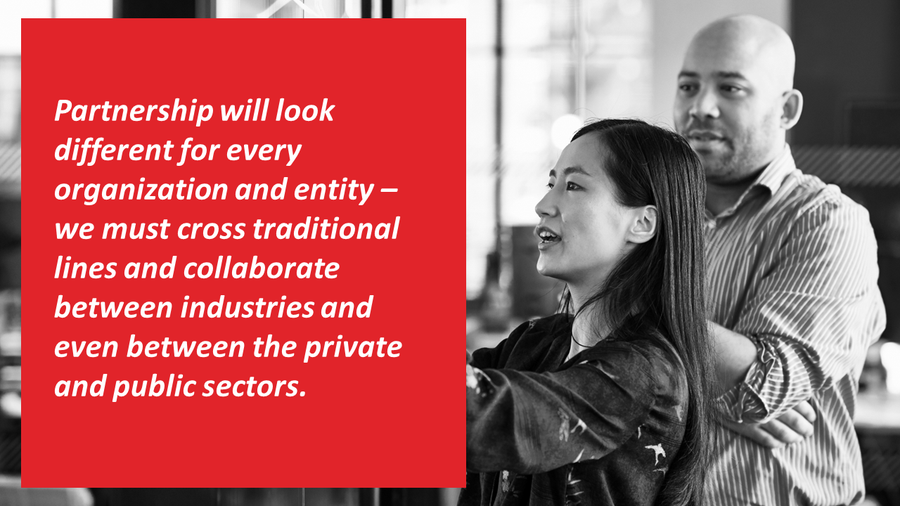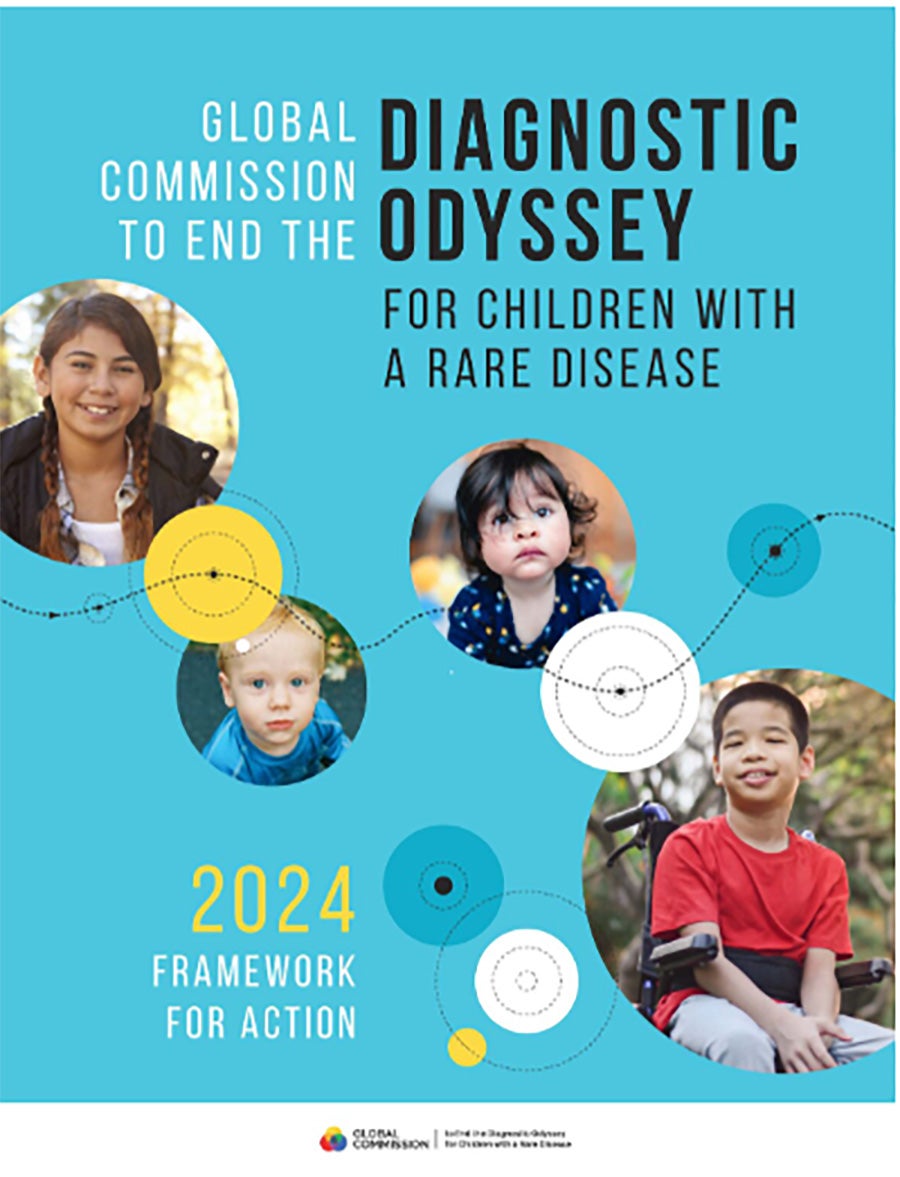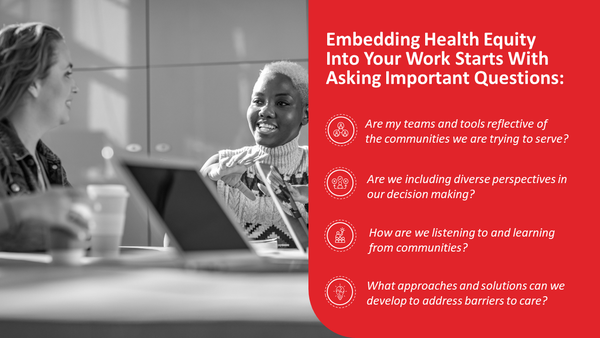For more than 240 years, Takeda has understood why putting patients first matters. Fuelled by our purpose to create ‘better health for people and a brighter future for the world’, we remain committed to achieving equitable healthcare for all. We acknowledge that addressing the multi-faceted global issue of inequity in healthcare is both a pressing social need and a business priority.
We proactively engage in dialogue, drive collaboration and share learnings focused on ways we can all help advance health equity. To facilitate this intricate and nuanced work, Takeda is leveraging its global capabilities and resources to embed health equity across our company. With this approach, our aim is to deliver innovative medicines and products to more of the people and communities that need them.
We recognize there is no one-size-fits-all solution for infusing health equity throughout an organization. Resources, tools and people will (and should) be different. Solutions and services will (and should) be customized and tailored to meet the needs of the patients and communities we’re ultimately trying to serve. Our decision-making framework of patient, trust, reputation, business (PTRB) — always in that order — provides an anchor that allows us to embed our health equity principles into our business operations.
Advancing health equity starts within the walls of an organization
Often, when companies think about health equity they simply deem it to be part of diversity, equity and inclusion (DE&I) or corporate social responsibility (CSR) initiatives. Understanding its relevance and the role companies can play may be difficult, but we believe that health equity is both an important social concern and an opportunity to aid our business. For Takeda, health equity can help us excel at holistic value-based healthcare outcomes; inform, improve and enhance clinical research; and support other opportunities to grow our global impact and create a more sustainable business. Embedding health equity also builds trust with local partners, allowing us to better understand the underlying causes of inequities and how we can co-create solutions with communities to drive change.
As we strive to foster a more inclusive health ecosystem, it has become apparent that this work is not a solo venture. Every contributor has an important and valued role to play — from the convener who can bring the right stakeholders together, to the subject matter expert who intimately understands local community dynamics, to the funder who has the financial means to support a programme.

Takeda
There is no simple solution to tackling health inequity, but we’re confident that infusing health equity principles across our organization is a strong step in the right direction. Guided by our foundational question — “What more can we do for patients?” — we’re constantly evolving. This is where our company’s commitment to health equity is key. We’re uniquely positioned to incorporate the lens of health equity into our work so it’s not a separate initiative, but rather a part of our daily efforts.
Putting our patients first through meaningful engagement
Integrating health equity considerations into the way we engage with patients continues to ground and guide our value- and outcomes-focused approach. We know that our most innovative medicines and therapies cannot achieve their potential impact if the people who need them can’t access them. Aware of this dynamic, our patient engagement initiatives are designed with a focus on inclusivity and accessibility, ensuring that under-resourced populations have equitable access to healthcare resources and services. Over the last few years, with guidance from several global authority commissions, we’ve refined our holistic patient engagement approach. This approach helps us engage with patients, collect data and integrate insights throughout the lifecycle — from discovery to delivery.
At Takeda, we’re constantly trying to find efficiencies in our governance and operations so we can focus on what matters most to patients. We’re using scientifically validated social determinants of health data to better understand patient groups across key markets. This helps our teams uncover insights around the perceptions, behaviours and attitudes that move patients closer to, or away from, healthcare. Our collective patient engagement work reinforces the critical need to not just bring patients to the table, but also to have their voices heard.
Ensuring diversity in clinical studies
One such area where we have seen this value operate in practice is through our development programme related to psoriasis. Much of what is known about psoriasis — a chronic skin disease — often does not reflect all skin tones. As a result, these gaps in care can lead to a delayed diagnosis or inadequate care for people of colour with this condition. In fact, individuals with darker skin are historically under-represented in both dermatologic education and research.
We are embedding health equity into the development programme for our investigative oral therapy for psoriasis, ensuring patient diversity is present in our clinical trials and beyond. Guided by our patient-first approach, we are disseminating culturally relatable resources including imagery of psoriasis that reflects the diversity of skin types found within the patient population. We are also providing educational materials aimed at training medical professionals to accurately diagnose psoriasis across different skin types and tones. If we can ensure that clinical trial participant populations, research and educational materials are reflective of the patients who are likely to use the treatment, then we’ll have a stronger understanding and confidence that our efforts are supporting many types of patients with psoriasis.
Supporting and improving communities by building bridges to care
One of the ways that we support patients throughout their journey is through community-based partnerships. By working with our communities, we can help create sustainable change — because when we meet patients where they are, we often see that the solution probably lies there too. This starts by equipping our teams with the right resources and investments to actively engage with communities. We then listen to the communities and patients to better understand the barriers they face. We take these conversations and glean learnings from their experiences and environment. Together, we co-create solutions that are tailored to the needs of the people they aim to serve across our development, discovery and delivery cycles. This is a long-term commitment because we cannot address any of these issues quickly nor alone — eventually collective efforts will add up and result in tangible, community-oriented change.
Our Oncology Business Unit (OBU) is working to support the Vietnamese American community, a population significantly impacted by lung cancer. We partnered with Gryt Health to convene a community-led advisory committee to uncover the key barriers patients, healthcare providers and the Vietnamese American community faced. We discovered that language and literacy were the biggest hurdles — imagine trying to digest new information while also having to translate it into your native language.
We asked ourselves: “Would a person actually be able to understand the risks, screening opportunities, treatment options, or how to best navigate the healthcare system in that circumstance?”
Our team gathered existing, culturally-relevant materials about lung cancer and worked with the community advisory board to ensure they were suitable and accessible for the Vietnamese American community. These resources are available on a centralized hub containing information to support the patients at every step along their journey. This reinforces our inclusive approach and commitment to support community-level needs to advance health equity. As the saying goes, nothing is for the community, without the community.
Innovative digital approaches can help advance health equity
Takeda is accelerating the use of data, digital and technology (DD&T) to speed the delivery of life-saving medicines, while also easing the burden of diagnosis and treatment for patients, their families and healthcare providers. These technologies are helping us identify areas where health inequities exist and how we may be able to address the gaps in care. We’ve seen this first-hand in the ways climate change is exacerbating health crises, like in the case of dengue fever.
In 2019, dengue was recognized by the World Health Organization (WHO) as one of the top 10 threats to global health. The incidence of dengue has risen 30-fold in the past 50 years, and it is now prevalent in more than 100 countries, in both rural and urban areas.1,2,3,4 Dengue is associated with broad economic and societal burdens, including risks of inequitable health and economic outcomes for vulnerable populations.1,5
Our recent Latin America Dengue Digital Innovation Challenge sparked health innovations and solutions that have the potential to improve dengue prevention, disease education and awareness, and to build further trust in vaccinations. The challenge had a mutually beneficial impact, as it enabled local organizations to access Takeda’s global expertise and network, while also providing Takeda with the chance to collaborate with innovative companies focused on fighting dengue fever across the region. The challenge received 50 high-quality ideas across Latin America, with topics ranging from improving disease awareness to generating real-world health data and even predicting dengue outbreaks. As the threat of dengue grows with climate change, it is increasingly important to work with communities and strengthen the dengue digital innovation ecosystem in Latin America and beyond.
The power of purpose-driven collaboration
Takeda is proud to be a founding member and co-chair of the Global Commission to End the Diagnostic Odyssey for Children with a Rare Disease — a multidisciplinary group of rare disease advocates, researchers, physicians and innovators from across the globe who are working to end the long and arduous diagnostic journey. I’m humbled to represent Takeda as a co-chair of the Global Commission, and proud of our work to identify innovative global solutions to tackle today’s and tomorrow’s challenges in rare disease diagnosis.

Global Commission to End the Diagnostic Odyssey for Children with a Rare Disease
The Global Commission envisions a world where there is equitable support and resources for all children living with a rare disease and their caregivers. That is why the Global Commission has expanded its membership to include more representatives from more countries, including Ghana and the Philippines. The Global Commission has also developed a framework for action in accelerating diagnosis to support global, regional and national efforts to end the diagnostic odyssey. Our goal is to ensure that this framework, and the growing number of case studies being collected globally — including from low- and middle-income countries — which bring it to life, are presented in a way that is both culturally relevant and accessible for countries who may have a less robust healthcare infrastructure. Through this, we hope to accelerate efforts to improve the diagnosis of rare diseases in children. Embedding health equity to build a brighter futureOur collective efforts to embed health equity throughout our organization have had a tangible effect on our ability to deliver sustainable impact for patients, our business and future generations to come. I am proud of where Takeda is on this journey right now, and excited about where we will go and the impact I hope we have toward helping every single individual reach their full health potential. Bringing an organization along on this journey takes time, commitment and investment. Advancing health equity requires us all to play a role.


